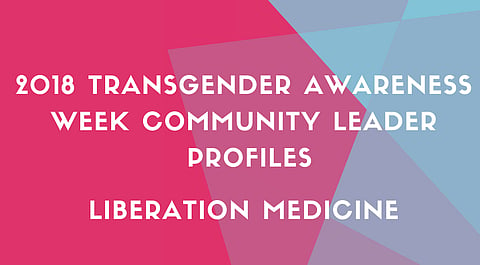Trans Awareness Week: Liberation Medicine Seeks Humane, Kind Healing
For Trans Awareness Week, the Emerald is publishing interviews by the Ingersoll Gender Center with important trans community members and the work they are doing for gender equity. This content is produced by Ingersoll Gender Center and provided to the Emerald for publication. To read the other interviews in this series, click here.
by Mattie Mooney
Liberation Medicine is a collective of Black queer and trans leaders. Mattie Mooney of the Ingersoll Center interviewed them on Friday, November 9th.
Who are you and what are you doing?
Liberation Medicine is a journey to figure out ways in which medicine can be practiced, shared, given and taken in a way that is kind, humane, respects self-autonomy, and leads to the freedom of Black people, especially the most marginalized amongst us. It is a journey to acknowledge as Black people our indigenous rights as healers, our indigenous rights to our bodies, and our indigenous rights to crafting knowledge, skills, and medicines that allow us ownership to our bodies, instead of being forced to invest in a medical system that is not for us. Liberation Medicine is firmly rooted in the liberation of Black trans people, with the belief that the fluidity that Black trans and gender non-conforming peoples embody is an indigenous road map, to the collective freedom of all Black people.
Why are you doing what you're doing?
Liberation Medicine was created and exists as a function of the desire of a queer trans Black immigrant. After battling racism, queerphobia, and transphobia as a medical student, they sought to figure out what the liberatory practice of medicine meant to them. The existence of Liberation Medicine as a project is crucial, because it is important for Black people both as individuals and as a collective to be given the space to understand what a liberatory practice of medicine looks like for us. It is important for us to take our healing into our own hands and to be able to craft as many autonomous medicinal systems as possible. Systems that place us into our full humanities, and into our Afro indigeneities. We cannot continue to engage with medical systems that kill us, maim us, and traumatize us. We can and are able to heal ourselves. Liberation Medicine is a journey to doing just that.
What is the biggest boulder you're trying to move in your work?
Beginning with communities that are the most harmed by the western medical community, starting with Black queer and trans communities. This is difficult because the Black trans and queer communities in Seattle carry such exhaustion from living in such intense isolation and oppression and going without our physical, mental and emotional needs being met that we are not always able to gather in a collective space of healing. One of the goals of the Liberation Medicine Project is that we are also trying to meet the direct needs of the Black trans and queer communities in terms of housing, medical care, mental health all as a function meeting the current, and present need of our community. A key principle of Liberation Medicine is to disinvest from Western medical systems and build up an Afro indigenous and autonomous medical system instead. It is often disheartening to meet other Black individuals who are so deeply invested in the Western medical system that the idea of Black-centered, Black-led decolonized health system seems offensive.
Where do you see your work in three to five years?
Time is a construct — check back in with us in three to five years.
When do you feel the most powerful? What makes you feel the most powerful?
Liberation Medicine Project as a collective feels the most healing and medicinal when there is clarity in knowing one's body and that we as a people don't have to give ourselves to the Western medical system to find that healing. When we are able to define for ourselves what sickness and healing is within our own indigenous frameworks, as opposed to white colonial frameworks. We are the most powerful when work as healers is seen as a form of freedom work and not something that is divorced from social justice.
Help keep BIPOC-led, community-powered journalism free — become a Rainmaker today.


